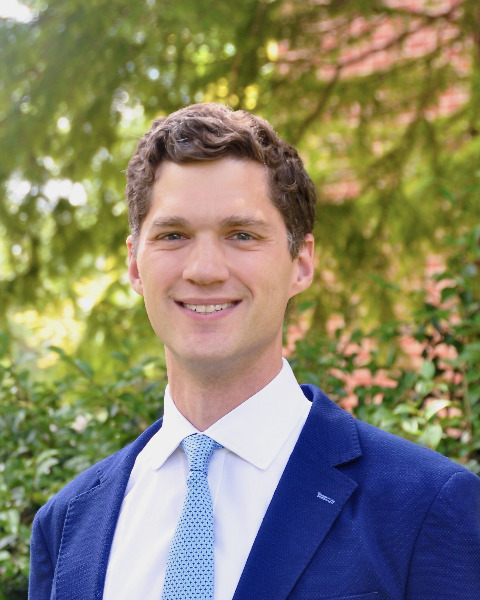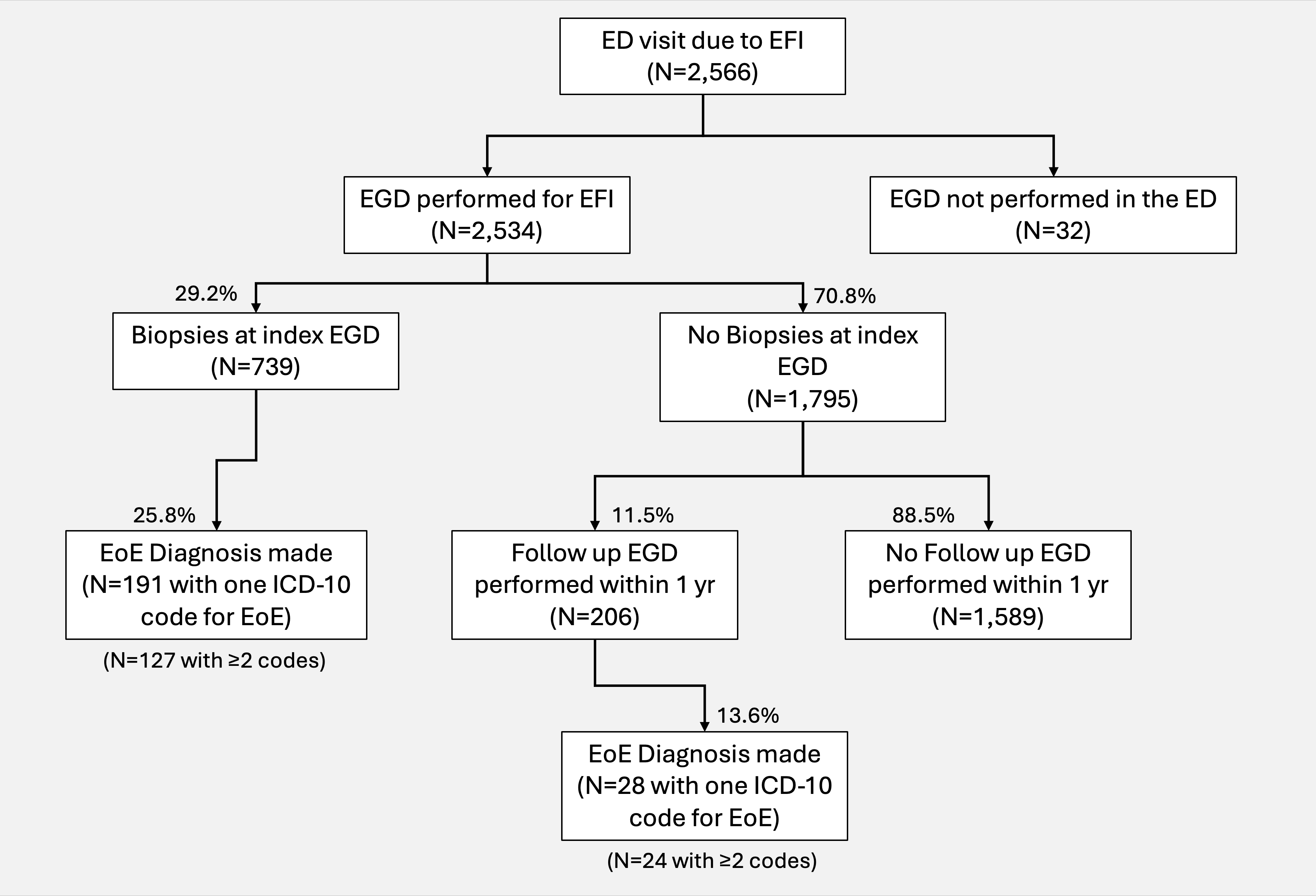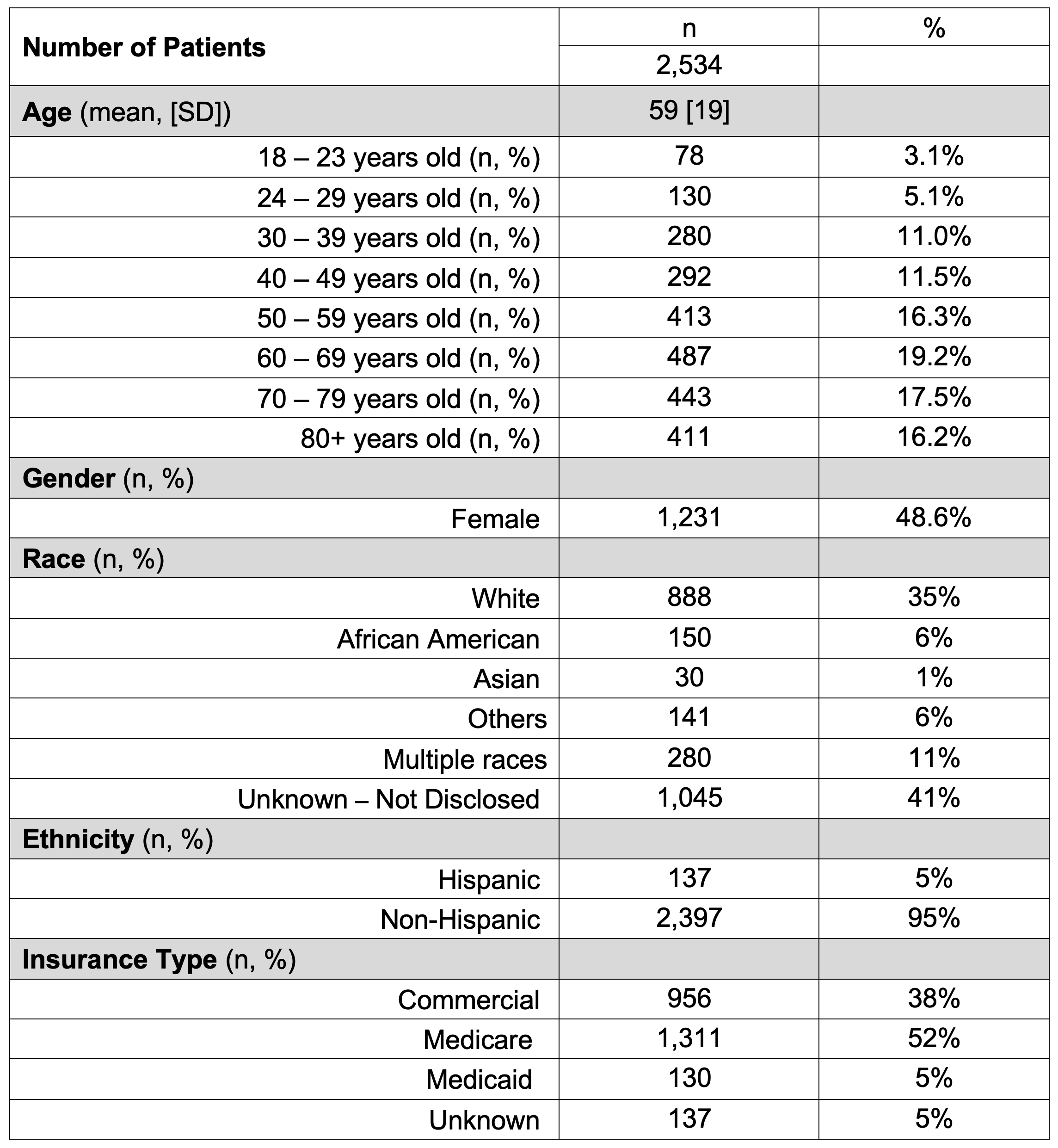Oral Paper Presentation
Annual Scientific Meeting
Session: Plenary Session 3B: Luminal GI / Endoscopy / Pancreas
46 - Real-World Study of Biopsy Practices During Food Impactions in the Emergency Department: Multi-State GI Practice
Tuesday, October 28, 2025
2:15 PM - 2:25 PM PDT
Location: North Ballroom 120BC

Walker D. Redd, MD, MSCR
Center for Gastrointestinal Biology and Disease, University of North Carolina School of Medicine
Chapel Hill, NC
Presenting Author(s)
Award: ACG Governors Award for Excellence in Clinical Research (Trainee)
Walker D. Redd, MD, MSCR1, Evan S. Dellon, MD, MPH2, Pradeep K. Bekal, MD3, Steven R. Gay, MD3, James S. Leavitt, MD4, Lubin F. Arevalo Santana, MD4, Amit Sabban, 5, Ryan B. Thomas, PharmD, MS6, Bram P. Raphael, MD7, Amr Radwan, MBBCh, MA7, Sarette T. Tilton, PharmD8, Nami Pandit, PharmD9, Devrim Eren, MS, PhD10
1Center for Gastrointestinal Biology and Disease, University of North Carolina School of Medicine, Chapel Hill, NC; 2Center for Esophageal Diseases and Swallowing, University of North Carolina School of Medicine, Chapel Hill, NC; 3Gastro Health, Cincinnati, OH; 4Gastro Health, Miami, FL; 5Latica, Ramat Gan, Tel Aviv, Israel; 6Regeneron Pharmaceuticals, Inc., Sleepy Hollow, NY; 7Regeneron Pharmaceuticals Inc., Tarrytown, NY; 8Sanofi, Cambridge, MA; 9Sanofi, Morristown, NJ; 10Sanofi, Newtown, PA
Introduction: Eosinophilic esophagitis (EoE) is a chronic, progressive, type 2 inflammatory disease, and is now the most common cause of esophageal food impaction (EFI). However, clinicians often overlook the diagnosis of EoE when patients present to emergency department (ED) with an EFI. The objective of this study was to characterize the management of EFI cases during and after ED visits in the community setting.
Methods: A retrospective cohort study using de-identified electronic medical records from a real-world data repository from 58 gastroenterology practices across 6 US states (Latica) was performed from January 2018 to June 2024. Patients were included in the analysis if they had ≥1 ED visit with an associated International Classification of Disease (ICD-10) diagnosis code for EFI, ≥12 months of data after index ED visit, and age ≥18 years at index. Exclusion was previous diagnosis of EoE. Patient demographics and endoscopic follow-up were assessed following the index ED visit with EFI. Patients were considered lost to follow-up if they did not have any subsequent in-person outpatient clinic visit, telehealth visit or esophagogastroduodenoscopy (EGD) visit within one year of index within these practices. Biopsies collected at endoscopy was defined as ≥1 relevant Current Procedural Terminology (CPT) code for EGD with biopsy (43239). Patients were identified with EoE if they had at least one ICD-10 code of K20.0. Descriptive analyses were used for continuous variables as mean with standard deviation (SD) and N (%).
Results: 2,566 patients with EFI-related ED visit were identified. 2,534 (98.8%) underwent EGD at the time of index ED visit, mean age at presentation was 59 [19] years and 1,231 (48.6%) were female (Table 1). At the index EGD, 108 (4.3%) underwent a dilation, 739 (29.2%) had a code for biopsies, and of these, 191 (25.8%) received an EoE diagnosis (Figure 1). From the 1,795 (70.8%) patients who did not have biopsies collected during the index EGD, 837 (46.6%) were lost to follow up and only 206 (11.5%) had an outpatient follow up EGD performed within one year after the EFI-related ED visit.
Discussion: In this real-world study of community GI practices, a minority of patients had biopsies coded during their EFI-related ED visit and follow-up EGD rates were rare. If data are confirmed with procedure documentation, collection of esophageal biopsies and follow-up may represent opportunities for quality improvement.

Figure: Table 1. Patient Demographics at the time of EFI-related EGD during ED Visit.
EFI, Esophageal Food Impaction; EGD, esophagogastroduodenoscopy; ED, Emergency Department

Figure: Figure 1. EGD with biopsy Flowchart of patients who visited an ED due to EFI.
ED, Emergency Department; EFI, Esophageal Food Impaction; EGD, esophagogastroduodenoscopy
Disclosures:
Walker Redd: Sanofi – Consultant.
Evan Dellon: AbbVie – Consultant. Adare/Ellodi – Consultant, Grant/Research Support. Akesobio – Consultant. Alfasigma – Consultant. ALK – Consultant. Allakos – Consultant, Grant/Research Support. Amgen – Consultant. Apogee – Consultant. Apollo – Consultant. Aqilion – Consultant, Grant/Research Support. Arena/Pfizer – Consultant, Grant/Research Support. Aslan – Consultant. AstraZeneca – Consultant, Grant/Research Support. Avir – Consultant. Biocryst – Consultant. Bryn – Consultant. Calypso – Consultant. Celgene/Receptos/Bristol Myers Squibb – Consultant, Grant/Research Support. Celldex – Consultant, Grant/Research Support. Dr. Falk Pharma – Consultant. EsoCap – Consultant. Eupraxia – Consultant, Grant/Research Support. Ferring – Consultant, Grant/Research Support. GI Reviewers – Consultant. GSK – Consultant, Grant/Research Support. Holoclara – Consultant, Grant/Research Support. Invea – Consultant, Grant/Research Support. Knightpoint – Consultant. LucidDx – Consultant. Meritage – Grant/Research Support. Miraca – Grant/Research Support. Morphic – Consultant. Nexstone Immunology/Uniquity – Consultant. Nutricia – Consultant, Grant/Research Support. Parexel/Calyx – Consultant. Phathom – Consultant. Regeneron Pharmaceuticals Inc. – Consultant, Grant/Research Support. Revolo – Consultant, Grant/Research Support. Robarts/Alimentiv – Consultant. Sanofi – Consultant, Grant/Research Support. Shire/Takeda – Consultant, Grant/Research Support. Target RWE – Consultant. Third Harmonic Bio – Consultant. Uniquity – Grant/Research Support. Upstream Bio – Consultant.
Pradeep Bekal indicated no relevant financial relationships.
Steven Gay indicated no relevant financial relationships.
James Leavitt indicated no relevant financial relationships.
Lubin Arevalo Santana indicated no relevant financial relationships.
Amit Sabban indicated no relevant financial relationships.
Ryan B. Thomas: Regeneron Pharmaceuticals, Inc – Employee, Stock Options.
Bram Raphael: Regeneron Pharmaceuticals Inc. – Employee, Stock-publicly held company(excluding mutual/index funds).
Amr Radwan: Regeneron Pharmaceuticals Inc. – Employee, Stock-publicly held company(excluding mutual/index funds).
Sarette T. Tilton: Sanofi – Employee, Stock Options.
Nami Pandit: Sanofi – Employee, May hold stock and/or stock options in the company.
Devrim Eren: Sanofi – Employee.
Walker D. Redd, MD, MSCR1, Evan S. Dellon, MD, MPH2, Pradeep K. Bekal, MD3, Steven R. Gay, MD3, James S. Leavitt, MD4, Lubin F. Arevalo Santana, MD4, Amit Sabban, 5, Ryan B. Thomas, PharmD, MS6, Bram P. Raphael, MD7, Amr Radwan, MBBCh, MA7, Sarette T. Tilton, PharmD8, Nami Pandit, PharmD9, Devrim Eren, MS, PhD10, 46, Real-World Study of Biopsy Practices During Food Impactions in the Emergency Department: Multi-State GI Practice, ACG 2025 Annual Scientific Meeting Abstracts. Phoenix, AZ: American College of Gastroenterology.
Walker D. Redd, MD, MSCR1, Evan S. Dellon, MD, MPH2, Pradeep K. Bekal, MD3, Steven R. Gay, MD3, James S. Leavitt, MD4, Lubin F. Arevalo Santana, MD4, Amit Sabban, 5, Ryan B. Thomas, PharmD, MS6, Bram P. Raphael, MD7, Amr Radwan, MBBCh, MA7, Sarette T. Tilton, PharmD8, Nami Pandit, PharmD9, Devrim Eren, MS, PhD10
1Center for Gastrointestinal Biology and Disease, University of North Carolina School of Medicine, Chapel Hill, NC; 2Center for Esophageal Diseases and Swallowing, University of North Carolina School of Medicine, Chapel Hill, NC; 3Gastro Health, Cincinnati, OH; 4Gastro Health, Miami, FL; 5Latica, Ramat Gan, Tel Aviv, Israel; 6Regeneron Pharmaceuticals, Inc., Sleepy Hollow, NY; 7Regeneron Pharmaceuticals Inc., Tarrytown, NY; 8Sanofi, Cambridge, MA; 9Sanofi, Morristown, NJ; 10Sanofi, Newtown, PA
Introduction: Eosinophilic esophagitis (EoE) is a chronic, progressive, type 2 inflammatory disease, and is now the most common cause of esophageal food impaction (EFI). However, clinicians often overlook the diagnosis of EoE when patients present to emergency department (ED) with an EFI. The objective of this study was to characterize the management of EFI cases during and after ED visits in the community setting.
Methods: A retrospective cohort study using de-identified electronic medical records from a real-world data repository from 58 gastroenterology practices across 6 US states (Latica) was performed from January 2018 to June 2024. Patients were included in the analysis if they had ≥1 ED visit with an associated International Classification of Disease (ICD-10) diagnosis code for EFI, ≥12 months of data after index ED visit, and age ≥18 years at index. Exclusion was previous diagnosis of EoE. Patient demographics and endoscopic follow-up were assessed following the index ED visit with EFI. Patients were considered lost to follow-up if they did not have any subsequent in-person outpatient clinic visit, telehealth visit or esophagogastroduodenoscopy (EGD) visit within one year of index within these practices. Biopsies collected at endoscopy was defined as ≥1 relevant Current Procedural Terminology (CPT) code for EGD with biopsy (43239). Patients were identified with EoE if they had at least one ICD-10 code of K20.0. Descriptive analyses were used for continuous variables as mean with standard deviation (SD) and N (%).
Results: 2,566 patients with EFI-related ED visit were identified. 2,534 (98.8%) underwent EGD at the time of index ED visit, mean age at presentation was 59 [19] years and 1,231 (48.6%) were female (Table 1). At the index EGD, 108 (4.3%) underwent a dilation, 739 (29.2%) had a code for biopsies, and of these, 191 (25.8%) received an EoE diagnosis (Figure 1). From the 1,795 (70.8%) patients who did not have biopsies collected during the index EGD, 837 (46.6%) were lost to follow up and only 206 (11.5%) had an outpatient follow up EGD performed within one year after the EFI-related ED visit.
Discussion: In this real-world study of community GI practices, a minority of patients had biopsies coded during their EFI-related ED visit and follow-up EGD rates were rare. If data are confirmed with procedure documentation, collection of esophageal biopsies and follow-up may represent opportunities for quality improvement.

Figure: Table 1. Patient Demographics at the time of EFI-related EGD during ED Visit.
EFI, Esophageal Food Impaction; EGD, esophagogastroduodenoscopy; ED, Emergency Department

Figure: Figure 1. EGD with biopsy Flowchart of patients who visited an ED due to EFI.
ED, Emergency Department; EFI, Esophageal Food Impaction; EGD, esophagogastroduodenoscopy
Disclosures:
Walker Redd: Sanofi – Consultant.
Evan Dellon: AbbVie – Consultant. Adare/Ellodi – Consultant, Grant/Research Support. Akesobio – Consultant. Alfasigma – Consultant. ALK – Consultant. Allakos – Consultant, Grant/Research Support. Amgen – Consultant. Apogee – Consultant. Apollo – Consultant. Aqilion – Consultant, Grant/Research Support. Arena/Pfizer – Consultant, Grant/Research Support. Aslan – Consultant. AstraZeneca – Consultant, Grant/Research Support. Avir – Consultant. Biocryst – Consultant. Bryn – Consultant. Calypso – Consultant. Celgene/Receptos/Bristol Myers Squibb – Consultant, Grant/Research Support. Celldex – Consultant, Grant/Research Support. Dr. Falk Pharma – Consultant. EsoCap – Consultant. Eupraxia – Consultant, Grant/Research Support. Ferring – Consultant, Grant/Research Support. GI Reviewers – Consultant. GSK – Consultant, Grant/Research Support. Holoclara – Consultant, Grant/Research Support. Invea – Consultant, Grant/Research Support. Knightpoint – Consultant. LucidDx – Consultant. Meritage – Grant/Research Support. Miraca – Grant/Research Support. Morphic – Consultant. Nexstone Immunology/Uniquity – Consultant. Nutricia – Consultant, Grant/Research Support. Parexel/Calyx – Consultant. Phathom – Consultant. Regeneron Pharmaceuticals Inc. – Consultant, Grant/Research Support. Revolo – Consultant, Grant/Research Support. Robarts/Alimentiv – Consultant. Sanofi – Consultant, Grant/Research Support. Shire/Takeda – Consultant, Grant/Research Support. Target RWE – Consultant. Third Harmonic Bio – Consultant. Uniquity – Grant/Research Support. Upstream Bio – Consultant.
Pradeep Bekal indicated no relevant financial relationships.
Steven Gay indicated no relevant financial relationships.
James Leavitt indicated no relevant financial relationships.
Lubin Arevalo Santana indicated no relevant financial relationships.
Amit Sabban indicated no relevant financial relationships.
Ryan B. Thomas: Regeneron Pharmaceuticals, Inc – Employee, Stock Options.
Bram Raphael: Regeneron Pharmaceuticals Inc. – Employee, Stock-publicly held company(excluding mutual/index funds).
Amr Radwan: Regeneron Pharmaceuticals Inc. – Employee, Stock-publicly held company(excluding mutual/index funds).
Sarette T. Tilton: Sanofi – Employee, Stock Options.
Nami Pandit: Sanofi – Employee, May hold stock and/or stock options in the company.
Devrim Eren: Sanofi – Employee.
Walker D. Redd, MD, MSCR1, Evan S. Dellon, MD, MPH2, Pradeep K. Bekal, MD3, Steven R. Gay, MD3, James S. Leavitt, MD4, Lubin F. Arevalo Santana, MD4, Amit Sabban, 5, Ryan B. Thomas, PharmD, MS6, Bram P. Raphael, MD7, Amr Radwan, MBBCh, MA7, Sarette T. Tilton, PharmD8, Nami Pandit, PharmD9, Devrim Eren, MS, PhD10, 46, Real-World Study of Biopsy Practices During Food Impactions in the Emergency Department: Multi-State GI Practice, ACG 2025 Annual Scientific Meeting Abstracts. Phoenix, AZ: American College of Gastroenterology.



